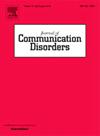A longitudinal exploration of inhibitory control in children with Developmental Language Disorder
IF 2.1
3区 医学
Q2 AUDIOLOGY & SPEECH-LANGUAGE PATHOLOGY
引用次数: 0
Abstract
Purpose
Previous research suggests that children with Developmental Language Disorder (DLD) exhibit weaker executive functioning, but there is limited understanding of how inhibitory control develops in this population over time. Adopting a longitudinal perspective, this study assessed inhibitory control in children with DLD compared with their typical developing peers.
Methods
We used a Flanker task to longitudinally assess interference control, a component of inhibitory control, in a group of 12 children with DLD and 31 typical development (TD) peers across three waves. At wave 1, participants had a mean age of 10.5 years, with data collected across three waves spanning ages 8.3 to 16.1 years.
Results
Regarding Response Time, incongruent trials were significantly slower than congruent and neutral trials across all waves for both groups separately. Moreover, the DLD group showed a larger interference effect (IE) than TD peers, but only in the first wave. Concerning accuracy, the DLD group showed lower scores in the first wave compared to the TD group. However, these differences diminished in the last two waves. Finally, no differences were found between groups in IE accuracy.
Conclusions
The DLD group showed a poorer overall inhibition compared to the TD group; however, this deficit seems to vanish over time. Our hypotheses are partially confirmed, aligning with evidence of deficits in inhibitory control in children with DLD. This suggests a domain-specific difficulty with inhibitory control that ameliorates during adolescence in DLD, driven by longer response times during incongruent trials and higher interference effects.
发展性语言障碍儿童抑制控制的纵向研究
先前的研究表明,患有发展性语言障碍(DLD)的儿童表现出较弱的执行功能,但对这一人群的抑制性控制如何随着时间的推移而发展的了解有限。采用纵向视角,本研究评估了DLD儿童与典型发展同伴的抑制控制。方法采用Flanker任务纵向评估12名DLD儿童和31名典型发育(TD)儿童的干扰控制(抑止控制的一个组成部分)。在第一波中,参与者的平均年龄为10.5岁,数据收集分三波进行,从8.3岁到16.1岁不等。结果在反应时间方面,两组在所有波上的不一致试验均显著慢于一致和中性试验。此外,DLD组表现出比TD组更大的干扰效应(IE),但仅在第一波。在准确性方面,与TD组相比,DLD组在第一波中的得分较低。然而,这些差异在最后两波中消失了。最后,两组之间的IE准确性没有差异。结论DLD组整体抑制作用较TD组差;然而,这种赤字似乎会随着时间的推移而消失。我们的假设得到了部分证实,与DLD儿童抑制控制缺陷的证据一致。这表明,在DLD的青春期,抑制控制的特定领域困难得到改善,这是由不一致试验中更长的反应时间和更高的干扰效应驱动的。
本文章由计算机程序翻译,如有差异,请以英文原文为准。
求助全文
约1分钟内获得全文
求助全文
来源期刊

Journal of Communication Disorders
AUDIOLOGY & SPEECH-LANGUAGE PATHOLOGY-REHABILITATION
CiteScore
3.30
自引率
5.90%
发文量
71
审稿时长
>12 weeks
期刊介绍:
The Journal of Communication Disorders publishes original articles on topics related to disorders of speech, language and hearing. Authors are encouraged to submit reports of experimental or descriptive investigations (research articles), review articles, tutorials or discussion papers, or letters to the editor ("short communications"). Please note that we do not accept case studies unless they conform to the principles of single-subject experimental design. Special issues are published periodically on timely and clinically relevant topics.
 求助内容:
求助内容: 应助结果提醒方式:
应助结果提醒方式:


